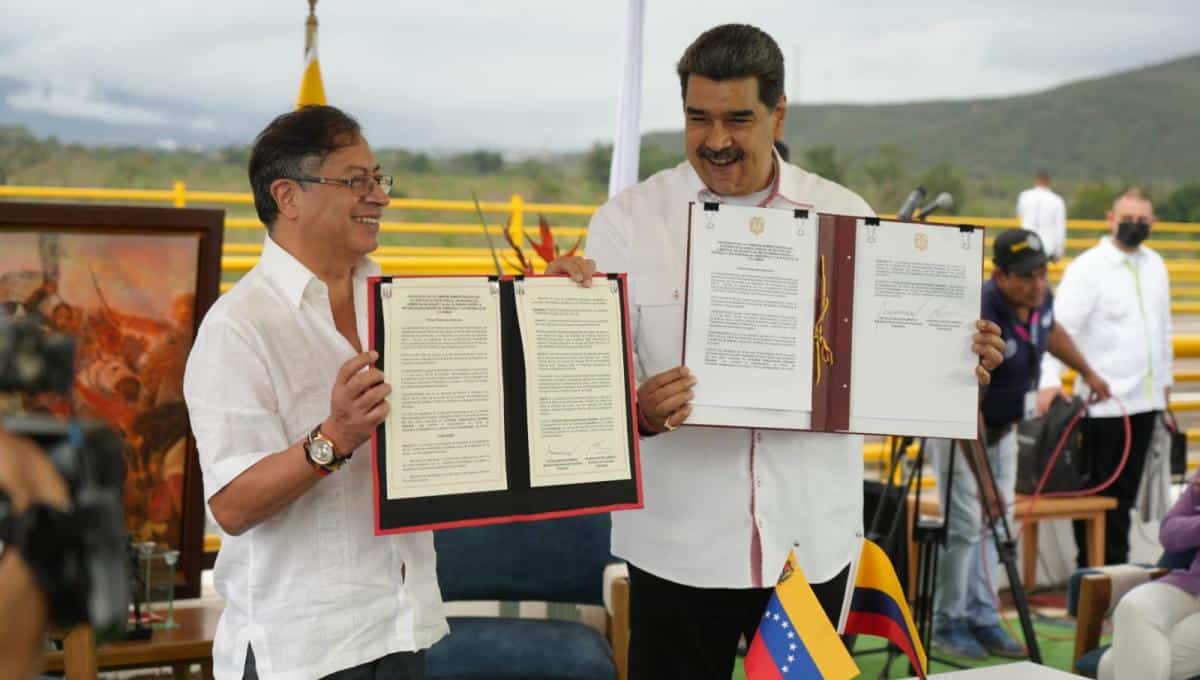
Colombian President Gustavo Petro (left) and Venezuelan President Nicolás Maduro (right) showing the partial trade agreement #28 they just signed on the Tienditas Bridge on Thursday, February 16, 2023. Photo: El Tiempo.

Orinoco Tribune – News and opinion pieces about Venezuela and beyond
From Venezuela and made by Venezuelan Chavistas

Colombian President Gustavo Petro (left) and Venezuelan President Nicolás Maduro (right) showing the partial trade agreement #28 they just signed on the Tienditas Bridge on Thursday, February 16, 2023. Photo: El Tiempo.
This Thursday, February 16, the president of Venezuela, Nicolás Maduro, and the president of Colombia, Gustavo Petro, signed the Partial Scope Trade Agreement No. 28. The signing of this memorandum of understanding ratifies the resumption of full relations between Colombia and Venezuela at all levels.
President Maduro arrived this Thursday afternoon, accompanied by his wife and Deputy Cilia Flores, Vice President Delcy Rodríguez, and by members of his cabinet. After arriving at the Santo Domingo airport, in the state of Táchira, they crossed the Atanasio Girardot “Tienditas” bridge on the Colombian side of the border to meet with President Petro.
Llegamos a Santo Domingo (Venezuela) donde esperamos al presidente @NicolasMaduro y vamos rumbo a San Antonio para asistir al encuentro con el presidente @petrogustavo para la firma del acuerdo de alcance parcial de naturaleza comercial 28. pic.twitter.com/MlLtH0WNkA
— Armando Benedetti (@AABenedetti) February 16, 2023
President Maduro stated that bilateral relations have been taking on a new dynamic in all aspects, recalling that they gave the order to open all the border crossings in the country to strengthen relations with Colombia.
“Our relations are setting a good pace,” he said, “the signing of this trade agreement, which updates tariffs, products to exchange, priorities, laid the foundations for the expansion of binational trade.”
Les comparto el Comunicado Oficial sobre la firma del Acuerdo de Alcance Parcial de Naturaleza Comercial Nº 28 firmado entre Venezuela y Colombia, hoy #16Feb. ¡Estamos marcados por la providencia y el destino a hacer vida como hermanas y hermanos! pic.twitter.com/FqryTGKPmo
— Nicolás Maduro (@NicolasMaduro) February 17, 2023
He also noted that the Venezuela of today is very different from that of 2011 when the binational exchange agreement was originally signed. “We imported everything, we had an oil checkbook, we had 100 years with that dynamic, there were petrodollars to bring everything in.”
“The Venezuela of 2011,” Maduro added, “had net oil income of $56 billion, an oil checkbook to take out and buy what had to be bought in the world, we imported 80% or 85% of everything, shoes, shirts, cars, onions, potatoes, meats, whatever.”
“Today the situation is structurally different,” he said, “because Venezuela is subjected to a blockade, economic, commercial, financial persecution, illegal and immoral sanctions, which hit the (economic) structure, the backbone of national income. We went from $56 billion in one year, to $700 million the next year, and the year that ended we reached perhaps close to $5 billion, barely 10% of what the country’s income was four or six years ago.”
President Maduro explained that as a consequence of this situation, a plan for a war economy was designed, and actions were taken to create new systems, exchange and commercial, to stimulate national production.
He recalled that at the end of 2022 Venezuela achieved significant economic growth of 15% of GDP, “and for the first time in 100 years, non-oil GDP grows more than oil GDP, a sign of recovery—and although the body is still subjected to relentless torture through financial and commercial persecution, through sanctions, through the blockade, the economy shows signs of life, that it wants to live.”
Heading for the special economic zone
President Maduro, enthusiastic about the commercial growth between the two countries, commented on the proposal of Governor Freddy Bernal, who promoted the idea of a binational economic zone of common development between the states of Norte de Santander and Táchira, of Colombia and Venezuela respectively. “I believe that this agreement creates the basis for us to take steps in that direction,” concluded the Venezuelan president.
He proposed this Thursday to form a team, together with the mayors and governors of the region, to accelerate the creation of a binational economic zone.
Maduro stated that the monetary problem between Norte de Santander and Táchira has already been resolved. “There is only one currency for commercial activity,” he said. “One of the things that we learned by walking, marching, receiving the blows of criminal sanctions, is that a war economy model is a multi-currency model.”
“I think we should check the figures, so that we can begin to project and devise what would perhaps be a gigantic historical step, the creation of that Binational Economic Zone of Shared Development between Norte de Santander and Táchira,” Maduro insisted on Petro. “It would be the first step to unite the immense wealth and the immense economic strength that the Colombian and Venezuelan border has.”
#EnVivo 📹 | Presidente de la República Bolivariana de Venezuela @NicolasMaduro y presidente de Colombia, Gustavo Petro, firman Acuerdo de Alcance Parcial de Naturaleza Comercial Nº 28 https://t.co/DFHnyATFA3
— Prensa Presidencial (@PresidencialVen) February 16, 2023
Below is the unofficial translation of the Partial Scope Trade Agreement No. 28 between Colombia and Venezuela:
(Últimas Noticias) by Odry Farnetano
Translation: Orinoco Tribune
OT/JRE/AU